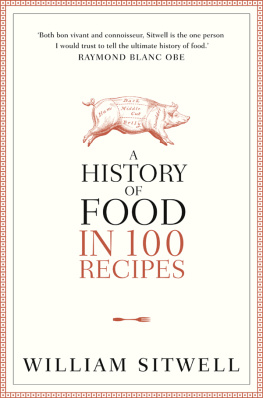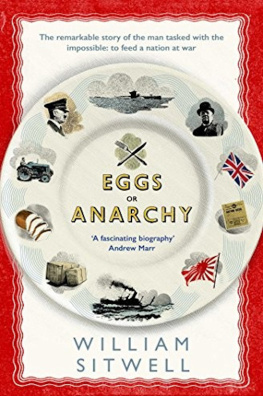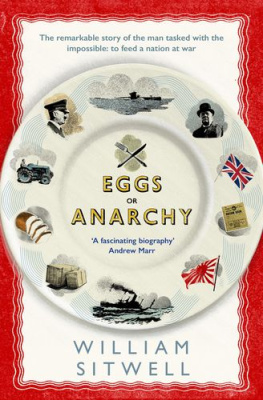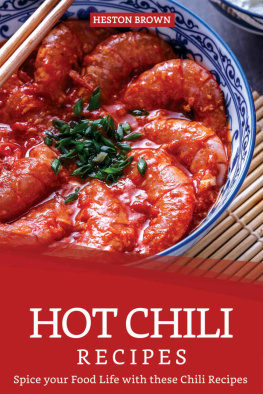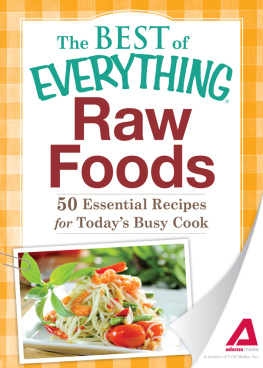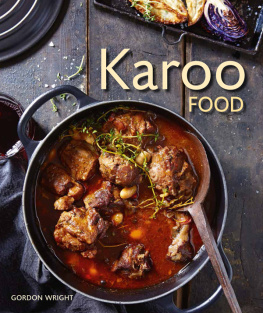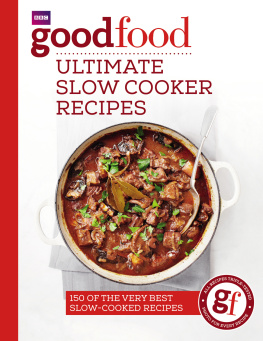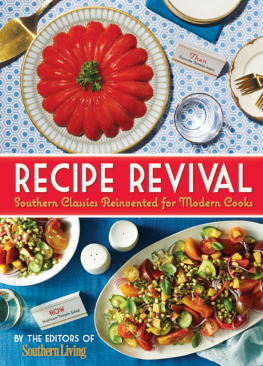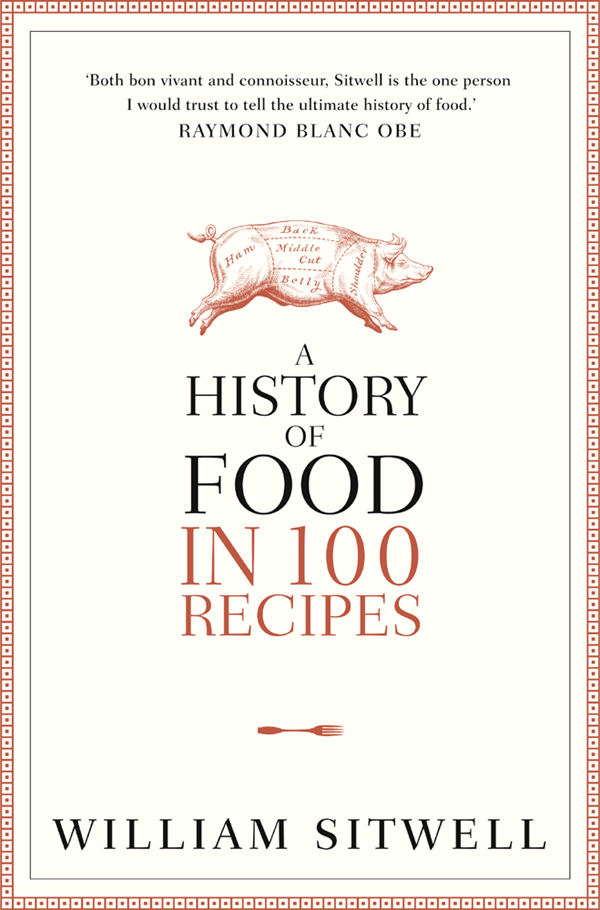

For Laura
Contents
A fter an auction at Sothebys, in the summer of July 2010, I came away with an armful of nineteenth-century cookery books and a smattering of food-related paintings and cartoons. They had been a tiny part of a vast culinary collection owned by one Stanley J. Steeger and now, as I took them home to Northamptonshire, they would be a large part of a rather small collection of one William R. S. Sitwell.
There on a shelf in my study, a room filled with giant photographs of food ripened figs in a bowl, peas in a pod and a Damian Hirst-style shark in jelly the books added intellectual and historical weight to what I already had. There were cookery books sent to me by publishers and PRs over the years hoping for coverage in the food magazine I edit, autobiographies penned by famous chefs I know and the odd food tome that I had actually paid for.
I started leafing through the old books I had bought, slightly wondering if, while they certainly gave character to the shelf, they would be as dry to read as they looked from their tired bindings and browned paper. But I was quickly struck by the characterful writing that leapt from so many of the pages. Where I had expected placid cooking instruction I found verbose opinion. Entries in the nineteenth-century Cassells Dictionary of Cookery , for instance, were filled with radical opinion and comment. It is a shocking thought that many die annually of absolute starvation, whose lives might have been saved twenty times over, wrote the editor, A. G. Payne, in a long and ranting introduction.
That view sounded rather familiar, I thought. Scraps of meat, fag ends of pieces of bacon, too often wasted, with a little judicious management, make a nice dish of rissoles, it continued, making the idea that using leftovers was fashionable as promulgated in magazines such as mine seem laughably prosaic.
I came across the writings of Dr William Kitchiner in his hilarious 1817 Cooks Oracle in which, aside from describing in every gory detail some of the cruellest cooking practices he had ever heard of (dont worry Ive also conveyed it with no stone left unturned on page 180), he lambasted those who had written cookbooks before him. Most, he wrote, were of no more use than reading Robinson Crusoe would enable a sailor to steer safely from England to India. He despaired of those who suggested of a bit of this a handful of that a pinch of tother a dust of flour a shake of pepper a squeeze of lemon. Such recipes left him bewildered. By contrast, Kitchiner promised that he would give the reader precision [that] has never before been attempted in cookery books. In a similar vein was Jules Gouff chef de cuisine of the Paris Jockey Club in whose Royal Cookery Book of 1868 he attacked the perfect uselessness of such cookery books as have hitherto been published.
This all sounded very familiar. Didnt every PR sending me a new cookbook from the latest culinary sensation claim that there hadnt been one quite like this one, that no previous book had been written with such clarity, that the recipes in this book really worked, that it was a new style of cooking guaranteed to capture the publics imagination?
Deciding to delve a little deeper, I soon came across Hannah Glasse who had published The Art of Cookery Made Plain and Easy in 1747. It could have been 2011. Her book, she declared, far exceeds anything of the kind ever yet published. I believe I have attempted a brand of cookery which nobody has yet thought worth their while to write upon.
Then back in 1500 there was This Boke of Cokery in which the anonymous author stated: Here begynneth a noble boke of festes ryalle and cookery a boke for a princes household or any other estates and the makynge therof according as ye shall find more playnely with this boke. The inference is clear: this boke was plainer, simpler and clearer than any other boke.
As well as such bold claims of authenticity and brilliance, it struck me that across the centuries the characters making these claims were as strong as the sentiments they expressed. In other words, there is nothing new about chefs today being mad, bad, passionate, obsessive, foodie fanatics. Furious rages echo out of kitchens throughout history, as does a passion for the best ingredients. Just as in the late 1980s Marco Pierre White was throwing the contents of a badly arranged cheese board at the wall of his restaurant, back in 350 bc the Sicilian Archestratus was losing his rag. If you wanted good honey, he said, it was only worth getting the stuff from Attica, otherwise you might as well be buried measureless fathoms underground. And if you didnt cook simply and poured sauce over everything, you might as well be preparing a tasty dish of dogfish (a fish variety considered as inedible then as its translation reads today).
Just as the passions of chefs, producers and consumers of food have brought the subject of food alive for me over the years, so this book is an investigation into, and a tribute to, the passionate people who have driven its story forward over the centuries. Were it not for a few rampant gourmands like the sauce-loving Apicius who in ad 10 wrote the only surviving cookbook from ancient Rome, or cheese-obsessed Pantaleone da Confienza sniffing his way around the dairies of Europe in the mid fifteenth century, the dim and distant past would be a great deal dimmer and considerably less tasty.
The history of food is coloured by the individuals who enveloped themselves in the subject and who wrote the recipes that help to tell its story. This book is my partisan choice of what I reckon are the 100 best stories: the biggest characters, the occasional culinary villain and some of the most delicious food in history. The recipes range, unashamedly, from the dead simple .
Its a history skewed to what interests me as an English food writer from the early twenty-first century, working in London and living in the English countryside. Its the story of constant stealing of recipes from Platinas pilfering of the works of Martino de Rossi in 1475 to the theft of content from Epicurious.com in 2011. It charts the birth, death and early rebirth of British food culture (were not quite there yet, but were on our way). It follows the rise of consumerism and considers the delights of supermarket convenience versus the well-being of the planet. And its the account of the influences of kings, queens, conquistadors, cooks, restaurateurs and greedy pigs like me who live, breathe and talk food and are constantly on the lookout for as good a meal as we can lay our hands on.
William Sitwell
Plumpton, Northamptonshire
March 2012
U nusually for a volume entitled A History of Food in 100 Recipes not every one of the ensuing chapters has an actual recipe and neither are they all eminently or indeed easily cookable. My ambition for the book is to take you on a journey where each stop gives you a colourful insight into the food scene of a particular period. Unfortunately in the early stages of this history not all the key players were as diligent in writing down their recipes as a cook might be today. As youll discover, for example, there are no Viking recipes, so Ive relied on evidence from an Icelandic saga, which details the various marauding shenanigans of Grettir the Strong and his rival Atli the Red, who might not have been foodies but surely ate a lot of dried fish. Neither, indeed, is there a recipe for bread in the early stages of English history we have to wait until the fifteenth century for that. But of course people were eating bread centuries before then, which is why youll have to forgive me for instead describing details of the Bayeux Tapestry to provide a glimpse into alfresco pre-battle catering from the eleventh century.
Next page
